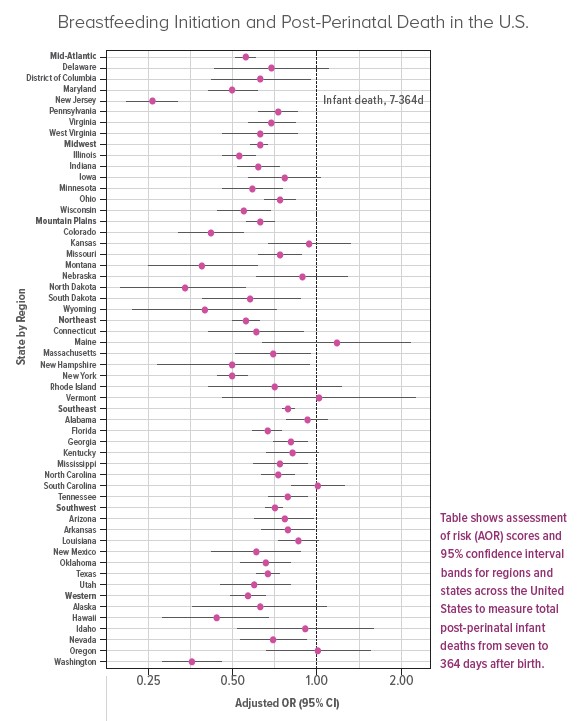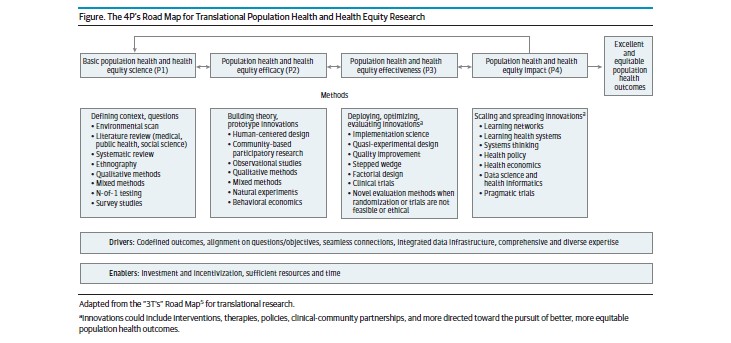Breastfeeding Linked to 33% Reduction in U.S. Post-Perinatal Infant Deaths
Research By: Julie Ware, MD, MPH | Ardythe Morrow, PhD, MSc
Post Date: May 21, 2023 | Publish Date: May 21, 2023
General and Community Pediatrics | Top Scientific Achievement


Breastfeeding offers substantial health benefits for babies, including a reduced risk of infant mortality. A new study sheds light on exactly how much this health-promoting behavior can reduce a baby’s risk of dying in their first year of life, and the number is significant—about 33%.
“Although there’s some variation in different areas of the country, our research found that the initiation of breastfeeding is significantly associated with lower post-perinatal infant mortality across the United States,” says lead investigator Julie Ware, MD, MPH. “This is a message we must continue to communicate to the public.”
Ardythe Morrow, PhD, was a co-author of the multi-center study conducted in collaboration with the Centers for Disease Control and Prevention. The analysis reviewed nearly 10 million birth certificates of babies born in the U.S. in 2016, 2017 and 2018. The birth certificates specified whether breastfeeding had been initiated at the time of discharge. Researchers also looked at more than 20,000 deaths occurring among the infants during their first year of life.
After controlling for factors such as maternal age and education, gestational age, smoking during pregnancy, enrollment in a federal supplemental nutrition program, and race and ethnicity, researchers found that overall, breastfeeding was associated with a 33% reduced risk of infant death from seven to 364 days compared to those who were not breastfed. The Mid-Atlantic and Northeast regions had the greatest post-perinatal infant mortality reductions (44%), while the Southeast had the least reduction (21%). Reduced post-perinatal infant mortality was present in all U.S. regions.
The consistency of the association between the initiation of breastfeeding and lower post-perinatal infant mortality supports the promotion, protection and support of breastfeeding as an important strategy in all state and regional infant mortality reduction initiatives, the researchers concluded.
More 2023 Research Highlights
Chosen by the Division of General and Community Pediatrics
Corley AMS, Gomes SM, Crosby LE, et al. Partnering With Faith-Based Organizations to Offer Flu Vaccination and Other Preventive Services. Pediatrics. 2022;150(3):e2022056193. doi:10.1542/peds.2022-056193
Anyigbo C, Jimenez ME, Sosnowski DW. Association Between Adverse Childhood Experiences at Age 5 Years and Healthcare Utilization at Age 9 Years. J Pediatr. 2022;246:227-234.e2. doi:10.1016/j.jpeds.2022.04.006
Berset AE, Burkhardt MC, Xu Y, Mescher A, Brinkman WB. Effect of Electronic Outreach Using Patient Portal Messages on Well Child Care Visit Completion: A Randomized Clinical Trial. JAMA Netw Open. 2022;5(11):e2242853. Published 2022 Nov 1. doi:10.1001/jamanetworkopen.2022.42853
Strawn JR, Xu Y, Cecil KM, et al. Early exposure to flame retardants is prospectively associated with anxiety symptoms in adolescents: A prospective birth cohort study. Depress Anxiety. 2022;39(12):780-793. doi:10.1002/da.23284
Real FJ, Whitehead M, Ollberding NJ, et al. A Virtual Reality Curriculum to Enhance Residents’ Behavioral Health Anticipatory Guidance Skills: A Pilot Trial. Acad Pediatr. 2023;23(1):185-192. doi:10.1016/j.acap.2022.07.011
View more discoveries from 50 research divisions and areas
Return to the 2023 Research Annual Report main features
| Original title: | Associations Between Breastfeeding and Post-Perinatal Infant Deaths in the U.S |
| Published in: | American Journal of Preventive Medicine |
| Publish date: | May 21, 2023 |
Research By

As an experienced board-certified pediatrician who specializes in breastfeeding medicine, I’m interested in improving maternal and child health through the promotion and support of breastfeeding, especially in those populations least likely to breastfeed.







